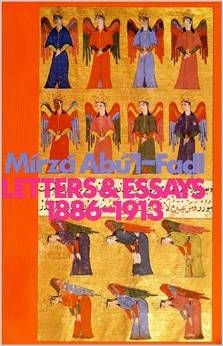
|
Abstract: Treatises of "the greatest and most learned of all Bahá'í scholars" about Alexander Tumansky; on meeting Abdu'l-Bahá; and on the meaning of angels, resurrection, civilization, tests, angels, holy spirit, and the saying "Knowledge is twenty-seven letters." Notes: Contributed by and posted with permission of publisher. Please support this online re-printing by ordering a copy of the book. A portion of this book scanned, with images, is available at books.google.com. See also Miracles & Metaphors. |
Letters and Essays, 1886-1913
by Mirza Abu'l-Fadl Gulpaygani
translated by Juan ColeLos Angeles: Kalimat Press, 1985
| single page | chapter 1 |  |
 click to order a copy |
Letters & Essays, 1886-1913 by Mírzá Abu'l-Fadl Gulpáygání
translated from the Arabic and Persian and
Kalimát Press
1600 Sawtelle Boulevard, Suite 34 Los Angeles, CA 90025
Copyright © 1985 Manufactured in the United States of America |
Contents Foreword, by Alessandro Bausani ................................ ix Editor's Note .................................................. xi Part I: Iran, 1886-1888 On the Meaning of Civilization .......................... 3 On the Resurrection Day ................................. 7 Why Moses Could Not See God ............................ 15 Against Blind Obedience ................................ 37 Part II: The Russian Empire, 1892 A Treatise for Alexander Tumansky ...................... 43 Part III: Palestine, 1894 On Meeting 'Abdu'l-Bahá ................................ 87 Part IV: Egypt, 1895-1914 The Bab and the Babi Religion .......................... 95 A Letter to Tripoli ................................... 111 On Tests and Trials ................................... 135 On Perfection and Imperfection ........................ 139 On the Reaction in Egypt to His Writings .............. 147 On the Meaning of Angels .............................. 155 The Reality of the Holy Spirit ........................ 171 Did Moses Prophesy Muhammad? .......................... 173 A Commentary on the Saying "Knowledge Is 27 Letters" .. 181 |
AboutHere are collected the letters and scholarly treatises of Mírzá Abú'l Fadl, famed as the greatest and most learned of all Bahá'í scholars. Included are commentaries, essays and correspondence written in Iran, Russia and Egypt over a period of almost thirty years. The letters written from 1886-1888, in Southwestern Iran, are among the few documents which throw light on Abú'l Fadl's early Bahá'í career. Also available for the first time in English is "A Treatise for Alexander Tumansky," written for the noted orientalist — a major work which provides an invaluable summary of the life of Bahá'u'lláh, as well as unique information on the controversial histories Táríkh-i Jadíd and Naqtatu'l-Káf. There is the courageous defense of the Bahá'í Faith that Abú'l Fadl was able to publish in the Egyptian press, the first article of its kind. And finally, the letters collected from the last years of his life that show his scholarship at its most profound and most mature. The startling modernity of Abú'l Fadl's thought is as challenging today as it was when first written. This book is required reading for any serious student of the Bahá'í religion. [Kalimat, 1985] |
[page ix]
Foreword
It is not easy for me to write a foreword to this book. I remember writing to Juan R. Cole some time ago that I did not think it was yet time to study the Bahá'í Faith historically and scientifically. It seemed as inconceivable to me as suggesting that Christians in the first century A.D. should have written on the Christian religion scientifically. I felt that we, as Bahá'ís, were too close, too interested, too emphatically involved in Bahá'í history to write about it objectively.The books of Bahá'í scholarship that have been published since that time have convinced me of the contrary. Young Bahá'í scholars, including Dr. Cole himself, have written on Bahá'í subjects as objectively as is possible for them. And I myself in a lecture on the occasion of the celebration of the Birth of Bahá'u'lláh (on November 12, 1983) made use of a concept first put forth by Cole: that of a science of "theophany" needed for an understanding of the Bahá'í Faith, almost as the Christians study their concept of incarnation.
An old friend of mine, Sr. Panella, a Bahá'í of Rome, now unfortunately passed away, used to say that the Bahá'í Faith means primarily: Evoluzione nel tempo, e unita nell'ora [Evolution in time, and unity at the present hour]. Truly, the whole Bahá'í Faith is centered on this theophanical idea. Bearing in mind the Bahá'í principles of the inaccessibility of God and the evolution of the exterior forms of religion, all of the doctrines of the Faith can be encompassed by the
[page x]
phrase "evolution in time." "Unity at the present hour" means that now the urgent aim of the Faith is the unity of mankind, in all its implications.
This book is a translation of certain works written by Mirza Abu'l-Fadl on the history and the transcendent importance of the Bahá'í religion. Abu'l-Fadl is well known to Bahá'ís. He was the greatest Oriental expounder of their religion. Naturally, he approaches the Faith from an Eastern perspective, explaining some of its more esoteric aspects. Nonetheless, this book is of extreme importance for the Bahá'ís. It is a book each Bahá'í should possess and read to obtain a better knowledge of what the Bahá'í Faith really is. Alessandro Bausani Rome
[page xi]
Editor's Note
| single page | chapter 1 |  |
|
|